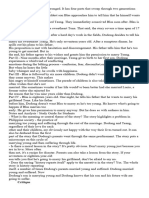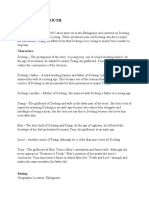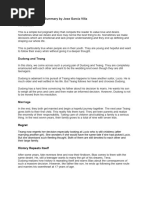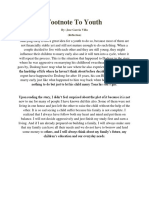Footnote To Youth (Summary)
Footnote To Youth (Summary)
Uploaded by
Michaela MercadoCopyright:
Available Formats
Footnote To Youth (Summary)
Footnote To Youth (Summary)
Uploaded by
Michaela MercadoOriginal Title
Copyright
Available Formats
Share this document
Did you find this document useful?
Is this content inappropriate?
Copyright:
Available Formats
Footnote To Youth (Summary)
Footnote To Youth (Summary)
Uploaded by
Michaela MercadoCopyright:
Available Formats
"Footnote to Youth" begins with the main character Dudong working in the fields.
He takes no real joy in his dusty work; he is too distracted,
impatient to get home and tell his father that he has asked Teang, the woman he loves, to marry him—and she has accepted. He is
preoccupied by feelings of adulthood and masculinity, believing himself to be grown and capable. On the way home, he stops to bathe in a
creek, a symbolic gesture: he is beginning fresh, starting a new chapter in his life. At home, we see the labors of the home and the trials of old
age: Dudong regrets that he doesn't have a sister to help his mother with the housework; his father has a terrible and persistent toothache.
When he tells his father his news, the latter tries to talk him out of it—Dudong is young, only 17. But because he is only 17, he is headstrong
and sure of what he wants, so his father allows him to marry.
Nine months later, Teang gives birth to a boy, whom they name Blas. As Dudong waits out the childbirth in the yard, he frets to himself about
what it will mean to be a father, and he imagines himself having ten children. He is afraid and despondent rather than excited at the prospect,
and he is embarrassed to be a father and to have a child and to feel these things, though he does develop a sense of paternal pride upon
seeing the baby.
Over the course of six years, Teang gives birth six more times, which takes its toll on both her body and Dudong's. Both become old beyond
their years, and both regret having married so young; Teang bitterly wishes she had accepted the hand of another suitor, who in those six
years had married but had no children. Dudong does not want all these children, and one night he stays awake wondering why life can be so
cruel when youth is so full of dreams, so full of hope and expectation.
This same night, Blas, now 18, comes home late, and is unable to sleep. Dudong asks him what has him so agitated, and sees that the roles of
father and son are now reversed: where once Dudong was the stubborn, impatient youth who thought that to marry was to live, and his father
was the cautious, objective voice of reason, now Dudong's son has asked his girlfriend to marry him, and Dudong wants desperately for the
young man to reconsider. But he will not reconsider, and Dudong resignedly gives his consent. Thus the impatience of youth perpetuates itself,
along with the wisdom of years. Though love may at first overcome, life soon catches up.
Dudong,17, is impatiently waiting for his father to return home so that he can tell him of his love for Teang and his desire to marry her. He
feels that at 17 he is a grown man and is ready for the next important step in his life. When he tells his father that he has asked Teang to
marry him and wants his blessing, there is a long and cruel silence. His father asks if he must marry her because Dudong is very young. Dudong
resents his father's question, and finally his father gives his consent.
Nine months later, Dudong is waiting outside while Teang gives birth to their first son, Blas. He feels young and inexperienced, a contrast to
how he felt nine months ago. Dudong did not want any more children, but they came anyway. For the next six years, Teang gave birth. Seven
children in all.
Teang did not complain. However her body was now shapeless and thin from bearing so many children and from the hard work of caring for
them and the household. Even though she loved Dudong, she cried and wished that she had not married so young. There had been another
suitor, Lucio, who was nine years older than Dudong. She chose Dudong because he was so much younger. Lucio had married after she married
Dudong, however, he was childless. She wonders if she had married Lucio, would she be childless? She feels that would have been a better lot
in life. But she loves Dudong, even though life has made him old and ugly.
One night Dudong goes outside and thinks about his life. He wants to have the wisdom to know why life does not fulfill Youth's dreams. Why
did life forsake you after love? He never finds the answer.
When Blas turns 18, he comes home and tells Dudong that he wants to marry Tena. Dudong at this time is only 36 years old, but he is
portrayed as a much older man. Dudong does not want Blas to marry so young. He asks the same question his father asked him. Does Blas
have to marry Tena? He does not want him to make the same mistake he did. Blas also reacts with resentment. Dudong realizes that he is
dealing with Youth and Love, and they will triumph over this situation. After that, comes real life. He gives his consent, feeling sad and sorry
for his son.
He called this "Footnote to Youth" because a footnote is an additional comment or reference on the content of the text. He is telling youth to
pay attention to the lesson of this story.
You might also like
- Footnote To Youth: Jose Garcia-VillaDocument5 pagesFootnote To Youth: Jose Garcia-VillaJoyce Ann EspanolaNo ratings yet
- Footnote To YouthDocument2 pagesFootnote To YouthMark Philip Besana100% (1)
- Eapp PaperDocument6 pagesEapp PaperFranz CorpuzNo ratings yet
- Footnote To Youth SummaryDocument1 pageFootnote To Youth SummaryElena De VillaNo ratings yet
- FOOTNOTE TO YOUTH DemoDocument1 pageFOOTNOTE TO YOUTH DemoNoime AceronNo ratings yet
- Footnote To Youth by Jose Garcia VillaDocument1 pageFootnote To Youth by Jose Garcia Villaaeryshaw11No ratings yet
- Footnote To The YouthDocument8 pagesFootnote To The YouthThyrealle Frances SorongonNo ratings yet
- StoryDocument6 pagesStoryMarge SantosNo ratings yet
- Beige Brown Vintage Group Project PresentationDocument9 pagesBeige Brown Vintage Group Project Presentationjuanamay583No ratings yet
- Lesson 4 - Footnote To YouthDocument16 pagesLesson 4 - Footnote To Youthcheenlaurenz.dejesusNo ratings yet
- Description and Functions of SettingDocument23 pagesDescription and Functions of Settingnaro ayosNo ratings yet
- Footnote To YouthDocument13 pagesFootnote To YouthJc Pauline Pabustan50% (2)
- Thank You Letter Doc in Pink Black Playful Illustrative Style - 20240402 - 121903 - 0000Document1 pageThank You Letter Doc in Pink Black Playful Illustrative Style - 20240402 - 121903 - 0000cordovajohnrey95No ratings yet
- Footnote To YouthDocument14 pagesFootnote To YouthRochelleCasador180No ratings yet
- 11 Stem4 B2 21ST CenturyDocument2 pages11 Stem4 B2 21ST CenturyLicop, Kurt Ashley G. (Licop, Kurt Ashley G.)No ratings yet
- Footnote To Youth.Document29 pagesFootnote To Youth.Crisanta Leonardo100% (2)
- Footnote To YouthDocument1 pageFootnote To YouthJammeleah Rose O. DiazNo ratings yet
- Reader and Historical CriticismDocument3 pagesReader and Historical CriticismjanjeeNo ratings yet
- UntitledDocument4 pagesUntitledJesrone TelebancoNo ratings yet
- Footnote To YouthDocument5 pagesFootnote To YouthAlfred ValenzuelaNo ratings yet
- Story Analysis Footnote To YouthDocument5 pagesStory Analysis Footnote To YouthYancie SiabocNo ratings yet
- LitanalysisDocument2 pagesLitanalysisJhenica JaravataNo ratings yet
- Footnote To Youth - EJoyDocument5 pagesFootnote To Youth - EJoySherwin AlmojeraNo ratings yet
- Activity 3 Footnote To Youth by Carlos Miguel DarlucioDocument2 pagesActivity 3 Footnote To Youth by Carlos Miguel DarlucioIced CoffeeNo ratings yet
- Literary Analysis OF Footnote To Youth: Submitted byDocument3 pagesLiterary Analysis OF Footnote To Youth: Submitted byKris JavierNo ratings yet
- BahomolodsDocument6 pagesBahomolodsLilet NuñezNo ratings yet
- Footnote To YouthDocument14 pagesFootnote To Youtherin s.100% (1)
- Dodong A FarmerDocument2 pagesDodong A FarmerAldrin CaloNo ratings yet
- Footnote To Youth Critique PaperDocument2 pagesFootnote To Youth Critique PaperJenneth Ebal100% (1)
- Footnote To Youth: CharactersDocument5 pagesFootnote To Youth: CharactersLECAROS, Madyline L.No ratings yet
- ENGLISH Catch-Up-Friday Worksheet FootnoteDocument2 pagesENGLISH Catch-Up-Friday Worksheet Footnotejjmrapada23No ratings yet
- Footnote To Youth by Jose Garcia VillaDocument2 pagesFootnote To Youth by Jose Garcia VillaJoanne VillanuevaNo ratings yet
- BSEdDocument1 pageBSEdMark Luis LapuzNo ratings yet
- Footnote To Youth Summary by Jose Garcia VillaDocument1 pageFootnote To Youth Summary by Jose Garcia VillaMa. Myla PoliquitNo ratings yet
- Explanation To Footnote To YouthDocument3 pagesExplanation To Footnote To YouthMarra Kathleen Ayaay100% (3)
- Critique Paper - Tiny TulioDocument1 pageCritique Paper - Tiny TulioDiana EspenaNo ratings yet
- Footnote To YouthDocument3 pagesFootnote To YouthJenelyn Amil100% (1)
- Jose Garcia Villa: Footnote To YouthDocument29 pagesJose Garcia Villa: Footnote To YouthRominna Dela RuedaNo ratings yet
- ClassmateDocument23 pagesClassmateSofie MendozaNo ratings yet
- Story Analysis: Footnote To Youth, The Mats, The Virgin, Magnificence, The Chieftest Mourner and The Summer SolsticeDocument25 pagesStory Analysis: Footnote To Youth, The Mats, The Virgin, Magnificence, The Chieftest Mourner and The Summer SolsticeArjenSaulog79% (42)
- Footnote To Youth 2Document10 pagesFootnote To Youth 2beyonka umali100% (2)
- ?IS102 Group 3 4 Short StoryDocument35 pages?IS102 Group 3 4 Short Storyrheagestoso3No ratings yet
- Footnote To YouthDocument1 pageFootnote To Youthrhizelle19No ratings yet
- Lit 1 Philippine Literature in English Midterm PaperDocument3 pagesLit 1 Philippine Literature in English Midterm PaperAkiramaeNo ratings yet
- "Footnote To Youth" by Jose Garcia VillaDocument2 pages"Footnote To Youth" by Jose Garcia VillaJENNY FAY S LIWAGONNo ratings yet
- My Whole LifeDocument1 pageMy Whole LifeJerome TanaelNo ratings yet
- Breaking Free From Your PastDocument3 pagesBreaking Free From Your Pastukkaushik66No ratings yet
- Philippine Literature PaperDocument3 pagesPhilippine Literature PaperPatricia Denise OrquiaNo ratings yet
- Footnote To Youth: By: Jose Garcia VillaDocument1 pageFootnote To Youth: By: Jose Garcia VillaPaula Mae NogalesNo ratings yet
- Footnote To YouthDocument6 pagesFootnote To YouthbagaipogwynethNo ratings yet
- Footnote To YouthDocument2 pagesFootnote To YouthSharlyn BalgoaNo ratings yet
- Footnote To Youth SummaryDocument5 pagesFootnote To Youth SummaryaltheaudelebNo ratings yet
- TRuestoryDocument1 pageTRuestoryJuvy MartinNo ratings yet
- The Essential Guide to Children and Separation: Surviving divorce and family break-upFrom EverandThe Essential Guide to Children and Separation: Surviving divorce and family break-upNo ratings yet
- Certified List of Candidates For Congressional and Local Positions For The May 13, 2013 2013 National, Local and Armm ElectionsDocument2 pagesCertified List of Candidates For Congressional and Local Positions For The May 13, 2013 2013 National, Local and Armm ElectionsSunStar Philippine NewsNo ratings yet
- Arvind Kumar Vs The State 28012020 DELHCDE202003022016413678COM250679Document10 pagesArvind Kumar Vs The State 28012020 DELHCDE202003022016413678COM250679Mridushi DamaniNo ratings yet
- Gravity Falls Choose Your Own AdventureDocument4 pagesGravity Falls Choose Your Own Adventuredigoxby54No ratings yet
- Mfa4399 23 01 02 2024 520934Document12 pagesMfa4399 23 01 02 2024 520934tanishqdwivedi11No ratings yet
- Spice Cubic Trade Co., LTD 2-3-1 Nihonbashi Chuo-Ku Tokyo Japan 100-1100 TEL: 012-120-1134Document1 pageSpice Cubic Trade Co., LTD 2-3-1 Nihonbashi Chuo-Ku Tokyo Japan 100-1100 TEL: 012-120-1134Putri Jemimma ZildjianNo ratings yet
- Rome and Antiochus The Great - A Study in Cold War - E. Badian - Classical Philology, #2, 54, Pages 81-99, 1959 Apr - University of Chicago Press - 10.2307 - 266322 - Anna'sDocument20 pagesRome and Antiochus The Great - A Study in Cold War - E. Badian - Classical Philology, #2, 54, Pages 81-99, 1959 Apr - University of Chicago Press - 10.2307 - 266322 - Anna'sViktor LazarevskiNo ratings yet
- Big Charter Private LTD v. Ezen Aviation Pty. Ltd. 2020 SCC OnLine Del 171Document74 pagesBig Charter Private LTD v. Ezen Aviation Pty. Ltd. 2020 SCC OnLine Del 171Keertesh TripathiNo ratings yet
- Srisaila Devasthanam Login - Srisaila Devasthanam Online BookingDocument2 pagesSrisaila Devasthanam Login - Srisaila Devasthanam Online Bookingmadhu14987kushiNo ratings yet
- (Burton D. Fisher) Rigoletto (Opera Journeys Libre (B-Ok - Xyz) PDFDocument54 pages(Burton D. Fisher) Rigoletto (Opera Journeys Libre (B-Ok - Xyz) PDFValerio Sebastiani100% (1)
- Synopsis of Effect of Non Registration of The Partnership FirmDocument6 pagesSynopsis of Effect of Non Registration of The Partnership FirmVishesh KumarNo ratings yet
- ThemesDocument2 pagesThemesStanciu Florin-ionelNo ratings yet
- Ov M&aaDocument8 pagesOv M&aatoh.beng.liNo ratings yet
- IPC - Dr. Sharanjit.Document61 pagesIPC - Dr. Sharanjit.Yogesh KHANDELWALNo ratings yet
- In Gear Week 29 1 February 2016 HD PDFDocument6 pagesIn Gear Week 29 1 February 2016 HD PDFDavid LeaNo ratings yet
- UntitledDocument2 pagesUntitledShah IskandarNo ratings yet
- TRIPURA 10th CBSEDocument172 pagesTRIPURA 10th CBSEdaksh.dax007No ratings yet
- Burns: First Aid Handbook by Philippine Red CrossDocument21 pagesBurns: First Aid Handbook by Philippine Red CrossJanine SarzaNo ratings yet
- Cornell Notes 6Document5 pagesCornell Notes 6api-525394194No ratings yet
- مذكرة اسئلة على قصة Gulliver's Travels in Lilliput فى اللغة الانجليزية للصف السادس الابتدائى اللDocument11 pagesمذكرة اسئلة على قصة Gulliver's Travels in Lilliput فى اللغة الانجليزية للصف السادس الابتدائى اللAmira OmarNo ratings yet
- Idioms With Sentences: 1. A Feather in A CapDocument5 pagesIdioms With Sentences: 1. A Feather in A CapJasia HossainNo ratings yet
- Foundations of Philippine PolityDocument39 pagesFoundations of Philippine PolityPhaura ReinzNo ratings yet
- Please Read and Follow The Directions Carefully. Failure To Follow Will Be Sanctioned by Deduction of PointsDocument3 pagesPlease Read and Follow The Directions Carefully. Failure To Follow Will Be Sanctioned by Deduction of PointsRitchel BernalesNo ratings yet
- NGO COMM CV-MD Fazlul HaqueDocument9 pagesNGO COMM CV-MD Fazlul HaqueAnonymous OiZCPsL1No ratings yet
- Final Research IVDocument27 pagesFinal Research IVJoanna Camille PapalidNo ratings yet
- 6 - Resolution Approval of AIPDocument1 page6 - Resolution Approval of AIPBarangay Caritan SurNo ratings yet
- International Commercial Contracts PIL 5718Document20 pagesInternational Commercial Contracts PIL 5718pınar soysaracNo ratings yet
- Chefetz 2017 Dignity Is The Opposite of ShameDocument15 pagesChefetz 2017 Dignity Is The Opposite of ShameJenny Thiemer ArceNo ratings yet
- Dfa Lecture Cjh-Poea ProgramsDocument21 pagesDfa Lecture Cjh-Poea ProgramsCelso HernandezNo ratings yet
- The Charge of The Light BrigadeDocument11 pagesThe Charge of The Light BrigadeZalina Ahmad100% (1)
- Who Moved My Cheese_textDocument47 pagesWho Moved My Cheese_textPure Master's AcademyNo ratings yet

























































































